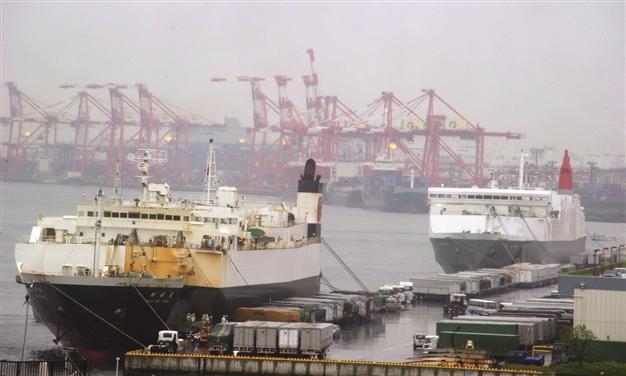Japan surplus down 21.2 percent in April
TOKYO - Agence France-Presse

Container ships at a Tokyo port in Japan on May 10. Japan’s current account surplus shrank by 21.2 percent to 333.7 billion yen ($4.2 billion) in April due to energy costs. EPA photo
Japan’s current account surplus unexpectedly shrank 21.2 percent in April from a year earlier, weighed down by higher energy costs, official data June 8.The surplus in the current account, the broadest measure of trade with the rest of the world, stood at 333.8 billion yen ($4.2 billion), the finance ministry said.
Economists had expected a bigger surplus of 455.6 billion yen, which would have been the first year-on-year rise in 14 months, according to Dow Jones Newswires.
Most of April’s surplus came from income on Japanese investment abroad, which alone produced a 1.398 trillion yen surplus, up 7.4 percent on year.
That more than offset a 962.5 billion deficit in trade of goods and services.
Exports rose, particularly for automobiles, after year-earlier drops following the March 2011 quake and tsunami disasters but imports also rose due to higher prices of gas and other fuels.
The deterioration for the 14th straight month is a negative sign for a still-fragile export-led economy.
Japan’s economy grew faster than first thought between January and March, official data showed June 8, but analysts warned of a slowdown caused by a strong yen, Europe’s debt woes and weakness in China.
Growth revised up
The Cabinet Office said gross domestic product grew by a revised 1.2 percent in the first quarter from the previous three months, up from a preliminary figure of 1.0 percent expansion. On an annualised basis, the revised figure was 4.7 percent in the quarter, higher than a preliminary 4.1 percent rise, according to the data.
The recovery has been largely driven by government reconstruction spending and analysts said weak demand in Europe and worries about growth in China could have an impact down the line.
That point was underscored by a finance ministry official on Friday who warned that strong yen and the financial crisis in Europe -- a major market for Japanese goods -- were serious threats to Japan’s export-oriented economy. Exports took a hit as the yen struck record highs against the dollar late last hurting manufacturers whose products become more expensive overseas on a strong currency.
















